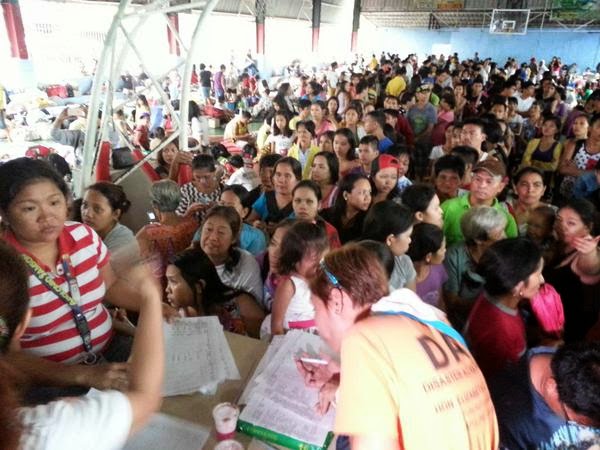 |
| Fire victims in Bgy. Apolonio Samson in QC are temporarily staying in two covered basketball courts. Photo by Adrian Ayalin |
Urban poor group Kalipunan ng Damayang Mahihirap (Kadamay) has called on the local government unit of Quezon City to spare from its off-city relocation program some 2,000 families from Kaingin Bukid, West Riverside in Barangay Apolonio Samson, Quezon City whose homes ware razed by fire on the first day of 2015.
This after Kadamay received reports from the victims that the LGU has started fencing the razed community which sits along a tributary of the San Juan River. The said river is among the 8 major waterways in the priority list of the Aquino administration for clearing.
"We have received reports that authorities are preventing residents from rebuilding their homes and that the enlistment process for them to transfer to off-city relocation sites in Pandi and Bocaue in Bulacan has already started.
In fact, authorities are as well persuading those who were not fire victims to relocate to Bulacan as well, and are being promised with P18,000 financial assistance," said Gloria Arellano, Kadamay national chair.
On Monday, Tadeo Palma, Secretary to the QC Mayor is expected to meet with the local barangay officials to expedite the relocation process.
"Forcibly relocating residents after a fire that razed their community and preventing them to rebuild their homes is a very opportunistic act. Sadly, this has been a practice of many LGUs in recent years.
"And it only leads us to believe that the incident, like any other fire incidents along waterways and in other urban poor communities in Metro Manila, is no different from arson which is the cheapest and fastest means of demolishing urban poor communities," said Arellano.
Kadamay has noted other similar fire incidents in urban poor communities along waterways in recent years since the Aquino administration announced in 2011 its plan to clear 8 major waterways in Metro Manila with informal settlements.
Big fires have razed homes in urban poor communities along Manggahan Floodway in Barangay Rosario, Pasig City in Febuary 2012; in three barangays along Estero Tripa de Gallina in Pasay City in July 2013; and along a triburary of the Pasig River in Barangay Guadalupe Nuevo (Macda), Makati City in October 2013, and along a creek in 3rd Avenue in Baranagy 120, Caloocan City in April 2014.
"Thousands of residents along waterways in Metro Manila have been forcibly relocated by the government after a massive fire that razed their communities, for authorities have failed to convince residents to voluntarily accept the off-city relocation offer year after year," Arellano said.
Many residents resist to leave their communities as employment and livelihood opportunities and other basic services are highly inaccessible in government relocation sites outside Metro Manila.
“The mandatory relocation of urban poor settlers to off-city relocation sites should be stopped immediately, as well as the demolition of homes of the urban poor through fire and other violent means," she added.
Of the 60,000 families living in danger areas in Metro Manila to be relocated before the Aquino administration ends on June 2016, 40,000 of which living along waterways, the government has only relocated 9,344 families as of 2014 according to the Department of Interior and Local Government.
More than half of the P50B Informal Settler Fund has been released by the Aquino administration since 2011 through its controversial Disbursement Acceleration Program supposedly to fund the relocation of families living along waterways in Metro Manila.
Meanwhile, relocatees from different off-city and in-city relocation sites nationwide are set to stage synchronized local protests led by Task Force Relocatees, a network of urban poor relocatees organizations, on January 14, a day before the visit of Pope Francis to the Philippines. Kadamay will also stage synchronized protests in different urban poor communities nationwide on the same day.
The groups aim for the Pope to facilitate their demand on the Aquino administration which is to address worsening unemployment among the urban poor as well as the dire situation in government's off-city relocation sites.
"Thousands of residents along waterways in Metro Manila have been forcibly relocated by the government after a massive fire that razed their communities, for authorities have failed to convince residents to voluntarily accept the off-city relocation offer year after year," Arellano said.
Many residents resist to leave their communities as employment and livelihood opportunities and other basic services are highly inaccessible in government relocation sites outside Metro Manila.
“The mandatory relocation of urban poor settlers to off-city relocation sites should be stopped immediately, as well as the demolition of homes of the urban poor through fire and other violent means," she added.
Of the 60,000 families living in danger areas in Metro Manila to be relocated before the Aquino administration ends on June 2016, 40,000 of which living along waterways, the government has only relocated 9,344 families as of 2014 according to the Department of Interior and Local Government.
More than half of the P50B Informal Settler Fund has been released by the Aquino administration since 2011 through its controversial Disbursement Acceleration Program supposedly to fund the relocation of families living along waterways in Metro Manila.
Meanwhile, relocatees from different off-city and in-city relocation sites nationwide are set to stage synchronized local protests led by Task Force Relocatees, a network of urban poor relocatees organizations, on January 14, a day before the visit of Pope Francis to the Philippines. Kadamay will also stage synchronized protests in different urban poor communities nationwide on the same day.
The groups aim for the Pope to facilitate their demand on the Aquino administration which is to address worsening unemployment among the urban poor as well as the dire situation in government's off-city relocation sites.

No comments:
Post a Comment